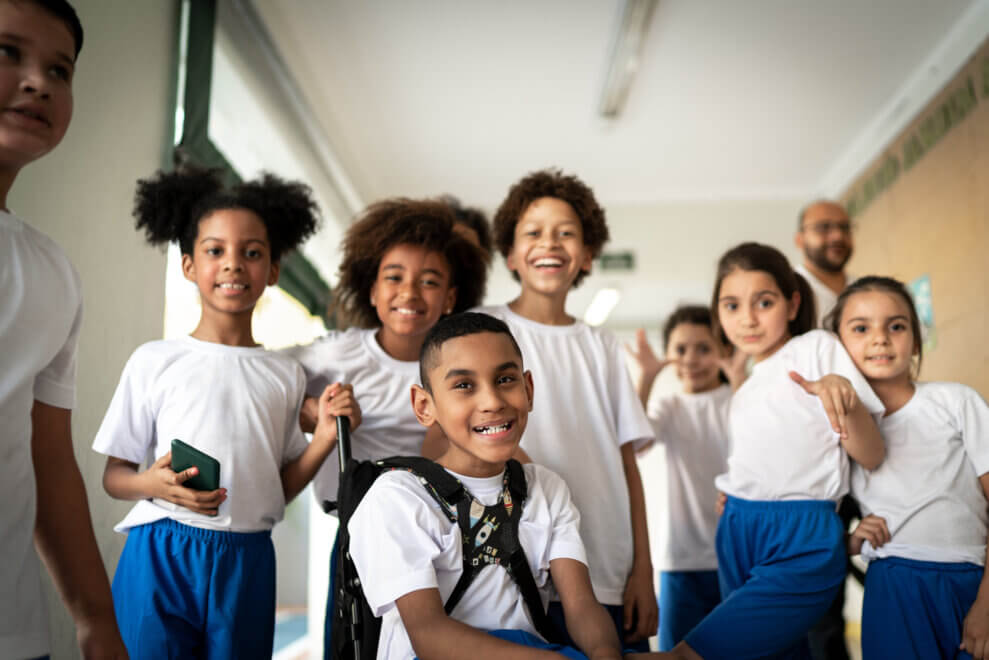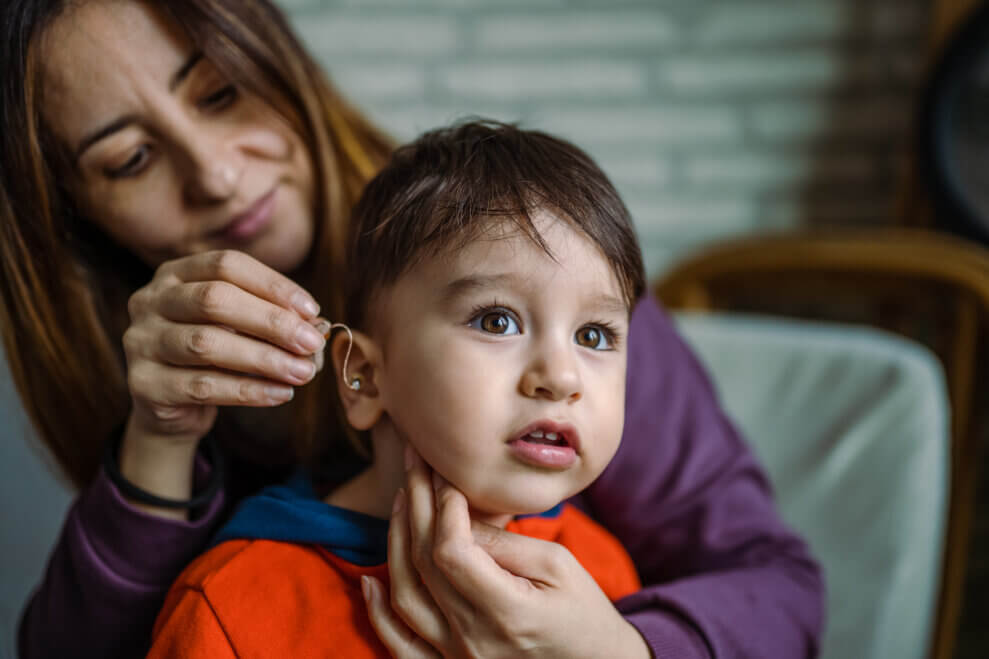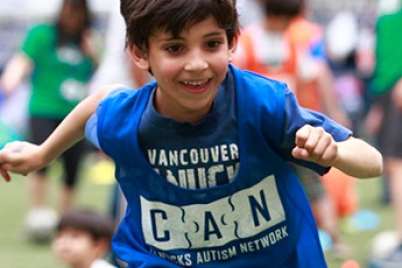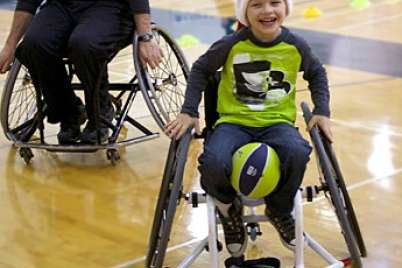
How to find adaptive and inclusive programs if your child has additional support needs
Finding adaptive and inclusive programs for your child can be challenging. Not only can the programs be difficult to find, they can also be hard to enroll in, and it can be even harder to know if your child will be engaged. Yet there are many organizations trying to aid in breaking down barriers in adapted physical activity, inclusion, and accessible programs.
Having inclusive and adaptive recreational programs available is so important because it can help your child develop independence, build friendships, and increase confidence, all while having fun.
Before we dive into inclusive and adaptive programs and how to find them, it’s important to recognize the differences between segregative, integrative, inclusive, and adaptive play when looking at programs for individuals with disability.
- Segregative: Segregation is when the participation of children with disabilities is provided separately in order to respond to a particular impairment in an isolation from children without disabilities.
- Integrative: Integration is when children with disabilities are placed in the same environment as able-bodied children.
- Inclusive: Inclusion is an attitude that welcomes diversity and differences with open arms and promotes equal opportunities. Inclusion emphasizes and incorporates change and modifications to overcome barriers that children with disabilities might face, to provide all children with equal opportunities to participate, learn, and play.
- Adaptive: Adaptive or adapted play refers to an activity that has been modified to meet the needs of a specific group. This could be through equipment, rules, content, support, environment, etc.
While the words “adaptive” and “inclusive” are often interchanged when promoting programs for children with disabilities, they’re not the same. Adaptive programs are modified to make a program more accessible, while inclusive programs permit children with disabilities to join the same program. If you’re keen on one type of program over another, be sure to ask the sport organization or program supervisor which is used.
Where to look for adaptive and inclusive programs?
Inclusive and adaptive recreation programs provide the opportunity for children with or without disability to participate in the same activity. For a program to be successful, inclusion, accessibility, and respect must be values that are shared by all coaches, instructors, and sport providers.

Online
Adaptive and inclusive informational organizations like Calgary Adapted Hub powered by Jumpstart provide a navigation aid for inclusive and accessible sport and recreation programming in the city of Calgary. Calgary Adapted Hub offers opportunities for children, youth, and families to gain confidence, grow friendships, and get active in new and different ways. There’s also Ontario Para Network, SportAbility in British Columbia, Foundations des Sports Adaptés (Adapted Sports Foundation) in Quebec, and many more! These websites and hubs are a wealth of knowledge and have valuable connections within the adapted community.
Sport organizations
To promote engagement and excitement within your child when looking for adapted programming, look first for the sport that interests your child, and then find adaptations and inclusive measures to provide them the ability to play that sport. A great way to practice this is to reach out to your local sports organizations. Many sports organizations have adapted programming, and if that organization doesn’t offer any adaptive programs, there is a chance that they will know of other sports organizations that do. Our friends at the PacificSport Centres have assembled a useful list of governing bodies and provincial adapted sport organizations from across Canada.
Community centres
Community centres also hold an abundance of information regarding recreation and programs. They are likely to know about programs around your community that are accessible to your and your child’s needs, as well as inclusive playgrounds and accessible indoor and outdoor spots for you and your family to gather and play.
To speak up and ask questions is never a burden or a hassle. Odds are, if you have the question, someone else does too and would love to also know the answer. When it comes to recreational programs for children, especially inclusive and adaptive programs, asking questions, connecting with others, and collaborating with other parents is always a valuable idea.
Choosing a program to suit your child’s needs, while ensuring they have fun
- Take a deep dive into the program and scan the interpersonal skills of the instructor: How do they manage conflict? How do they treat the children? What type of teaching or coaching style do they use? All children are unique and their needs differ. What one child might benefit from, another might not—and that’s normal. Trial and error is a common way of getting into a new sport, especially for children with differing abilities.
- Take a look at the physical environment: Can your child access the change rooms, bathrooms, and main rooms being used? Are there harsh lights or loud music playing? Will your child have challenges in accessing this environment? If a child is uncomfortable being in a space, they won’t enjoy it as much as they could, even if the program seems perfect.
- Look into the program support structure: What is the ratio of support staff? Are aids allowed to accompany a child?
- Look at the difficulty and the adaptability: Would your child have trouble playing these games and practicing these skills? Would they find the rules or lengthy instructions draining? If they cannot keep up, can the program or lessons be modified to better suit their needs?
Remember, you can and should ask these questions prior to registering for a program. The trained sport and recreation providers who are hosting the program know these answers and are happy to connect.

Ensuring a child’s sense of independence while participating in adaptive and inclusive programs
A parent’s natural instinct is to constantly want to nurture and protect their children, but sometimes, this can be removing opportunities for a child to practice their independence. It’s beneficial for the child if parents and guardians can allow their children to go to new programs, camps, and lessons. As stressful as this can be for both the parent and the child, it is a crucial and natural part of developing courage, self-determination, and maturity.
Focus first on the child as a person—their likes, dislikes, and personality—and see their unique needs as secondary. One of the best ways to motivate your child to engage in programs and activities is finding what activities they want to engage in. All children have activities that they find interesting, some of which may not even be on your radar. Adaptive programs are available for many activities, so don’t take anything off the table until you’ve researched programs in your area, and checked in with the sport organization that deals with the sport of interest. Having an activity that brings them excitement will help them feel more comfortable tackling other tasks as well, and can even enhance and grow their learning habits.
For children with disabilities, navigating the world, their likes and dislikes, and what works and doesn’t work for them can take time. To some, simple motor activities like doing a puzzle or playing with a hula hoop are easy, and to others, these are very difficult.
Letting your child explore different methods of learning, and then allowing your child to choose a method that works for them instead of trying to take over, is very helpful. Then, telling the program supervisor or instructor these learning tricks can help them better support your child, and can make the program all the more enjoyable for your child, you, and the instructors.
Adaptive and inclusive programs for children teach independence, patience, empathy, and control. Enrolling your child in recreational programs gives them the opportunity to build their current relationships and create new friendships. Most importantly, adaptive and inclusive recreation programs teach children a greater sense of self, can increase their self-confidence, and can bring them internal happiness, which, at the end of the day, is the most important thing for a child discovering the world of sport and physical literacy.






Look for an Accessible Sport Council in your municipality. They can be a wealth of information since they aren’t necessarily attributed to any one sport or disability group. Smaller communities may have a Sport Council/Commission that has an individual responsible for Adaptive or Parasport opportunities, while larger communities may have their own Accessible Sport Council devoted exclusively to serve the disability community.